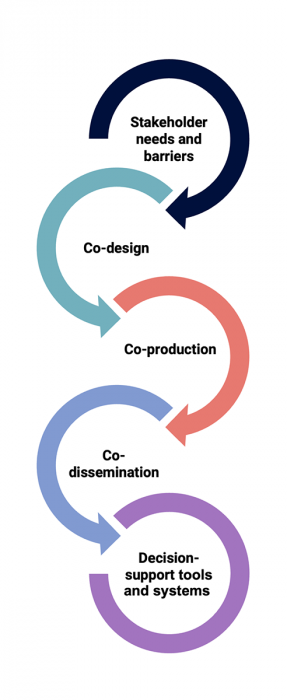As our planet heats up due to climate change, outbreaks of zoonotic diseases – diseases that spread from animals to humans – are increasing and expanding to new parts of the world, in particular Europe. Warmer temperatures, more variable rainfall, and the loss of biodiversity influence the survival and spread of zoonotic pathogens, and the reproduction and geographic location of their vectors, such as mosquitoes or ticks. Past and recent health crises, including the COVID-19 pandemic, have shown there is a need for stronger and more inclusive preparedness and responsiveness to epidemic-prone pathogens at the EU and global level. IDAlert’s approach expands the IPCC’s framework of hazard, exposure, vulnerability and risk by including the One Health triangle of animals, humans and the environment, allowing to contribute significantly to research at the intersection of One Health, EcoHealth, infectious diseases, and climate change. IDAlert will develop a systematic way to collect, analyse and communicate information about the direct and indirect effects of climate change at the human–animal–environment interface by: A participatory approach through iterative engagement, co-design, exchange processes and workshops is at the heart of the project. This will guide the research and ensure outputs address and respond to actual needs. IDAlert will work with stakeholders at European, regional, and local levels, including citizens, policy makers from the health sectors (human and animal), climate policy stakeholders, and landscape designers. They will be proactively engaged with in the project implementation using a co-design, co-production and co-dissemination process. IDAlert will bring together consortium researchers and non-academic partners to jointly develop the research project and define research questions that meet collective interests and needs. Research outputs will be widely disseminated leveraging stakeholder networks to maximise impact, and ensuring relevance of the research for health and climate change decision-makers, and that outputs are aligned with end-user needs. IDAlert will develop and improve existing tools, generate new knowledge, and produce capacity building materials to tackle the emergence and transmission of pathogens and enhance evidence-based decision-making. Develop innovative indicators and monitoring mechanisms to assess the health-relevant outcomes of climate policies and actions Develop predictive models and early warning systems for exposure and health impacts of climate change Develop tools for health impact and cost-benefit assessment of climate-change adaptation and mitigation measures Investigate health co-benefits and unintended consequences of climate adaptation and mitigation policies Identify the societal implications of climate change on health systems, including occupational health, and development of adaptation measures Develop training materials and guidelines to educate relevant actors in citizens’ daily life on climate change health impacts and to facilitate adaptation of health systems and practices The validity of the tools and methods developed in the project will be demonstrated in key hotspot sites in Spain, The Netherlands, Greece, Sweden, and Bangladesh, which are experiencing rapid urban transformation and climate-induced disease threats. They will test the new approaches to data collection, study fine scale drivers and mechanisms of transmission and emergence, and evaluate the direct and upstream consequences of policy. The local stakeholders will co-design and co-produce the activities in each site, providing essential and high quality data. Stakeholder: Benaki Phytopathological Institute (BPI) Stakeholder: Mosquito Control Service of Girona, Public Health Agency of Girona (DIPSALUT), Public Health Agency of Barcelona (ASPB) Stakeholder: Municipal health service Rotterdam, Rotterdam Municipality Stakeholder: Swedish Veterinary Stakeholder: International Centre for Diarrhoeal Disease Research, Bangladesh (iccdr,b) Stakeholder: Heidelberg Institute of Global Health (HIGH), Interdisciplinary Center for Scientific Computing (IWR) The consortium involves 19 organisations from Sweden, Germany, France, Spain, Greece, The Netherlands, Italy, UK, and Bangladesh, with world leading experts in a wide range of disciplines including zoonoses, infectious disease epidemiology, social sciences, artificial intelligence, environmental economics, and environmental and climate sciences.


Understanding the impacts of climate change on the emergence and spread of infectious diseases
A NEW PERSPECTIVE
One Health


THE PROCESS
A participatory approach
Research outputs will be widely disseminated leveraging stakeholder networks to maximise impact, and ensuring relevance of the research for health and climate change decision-makers, and that outputs are aligned with end-user needs.
Objectives
Tools
Data
Training
Case studies
Greece
Attica Region including Athens Municipality
Spain
Girona Province, & Barcelona Municipality
THE NETHERLANDS
South Holland Province, Rotterdam Municipality
SWEDEN
Uppsala County & Stockholm Municipality
Institute (SVA) BANGLADESH
Dhaka Municipality & Teknaf Subdistrict
GERMANY
Heidelberg & Rhein-Neckar-Kreis
About consortium




















By using our site you agree to our use of cookies to deliver a better site experience 🍪. For more information, please read read our Privacy Policy
